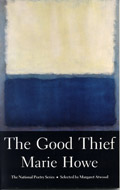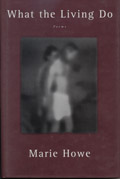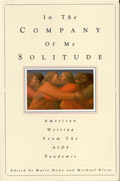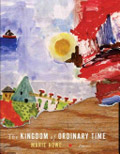
| NYWI HOME PAGE | VISITING WRITERS & EVENTS INDEX | VIDEO ARCHIVES | NYS AUTHOR & POET AWARDS |
 |
NEW YORK STATE
WALT WHITMAN CITATION OF MERIT
STATE POET AWARD WINNER
2012-2014
Marie Howe is widely admired for poetry that seeks answers to metaphysical questions in ordinary day-to-day experience. In Howe’s work, little incidents and inconsequential memories help to shed light on the nature of the soul and the self, as well as the meaning of life, death, love, pain, hope, despair, sin, virtue, solitude, community, impermanence, and the eternal.
Born in Rochester, New York in 1950, Howe grew up the second child and oldest daughter in a deeply committed and politically progressive Catholic family of nine children. She attended Sacred Heart Convent School where, as she told the Poetry for Students publication series, “the nuns modeled what it meant to live a spiritually active and politically engaged life.” After graduating the University of Windsor in Ontario, she worked as a reporter for a Rochester newspaper and taught high school English in the Boston area before taking up poetry as a serious pursuit at the age of thirty.
 She enrolled in the MFA program at the Columbia University School of the Arts where she received mentorship from the late poet Stanley Kunitz, who served as the first New York State Poet (1986-88). In 1988, Howe published her first poetry collection, The Good Thief, an exploration of human relationships, attachment, loss and personal transcendence. The book was selected by Margaret Atwood for the National Poetry Series. Also in 1988 she was selected by Stanley Kunitz to receive the Lavan Younger Poets Prize of the American Academy of Poets.
She enrolled in the MFA program at the Columbia University School of the Arts where she received mentorship from the late poet Stanley Kunitz, who served as the first New York State Poet (1986-88). In 1988, Howe published her first poetry collection, The Good Thief, an exploration of human relationships, attachment, loss and personal transcendence. The book was selected by Margaret Atwood for the National Poetry Series. Also in 1988 she was selected by Stanley Kunitz to receive the Lavan Younger Poets Prize of the American Academy of Poets.
In making her selection, Margaret Atwood said of The Good Thief, “Reading it you feel interest always, delight often, and occasionally that cool wind at the back of the neck that makes you think there's one more person in the room than there actually is. These poems are intensely felt, sparely expressed, and difficult to forget; poems of obsession that transcend their own dark roots.” Kunitz said, “Whether she is confronting the joys or terrors of existence, the light that falls on the page is suffused with grace and charity. In essence she is a religious poet, that rarity among writers of
her generation.”
 In 1989, Howe’s brother John, who was also one of her closest friends and who helped her arrange the manuscript of The Good Thief, died of AIDS. Howe told an interviewer for AGNI that John’s death, “transformed my aesthetic completely.” In 1997, Howe published her second collection of poems, What the Living Do, an elegy for John that abandons metaphor and other poetic flourishes in order to be, in the words of a Poetry Foundation biography, “a transparent, accessible documentary of loss.” Publishers Weekly named the book one of the five best poetry collections of 1997. The Boston Globe reviewer called it, “a deeply beautiful book, with the fierce galloping pace of a great novel.”
In 1989, Howe’s brother John, who was also one of her closest friends and who helped her arrange the manuscript of The Good Thief, died of AIDS. Howe told an interviewer for AGNI that John’s death, “transformed my aesthetic completely.” In 1997, Howe published her second collection of poems, What the Living Do, an elegy for John that abandons metaphor and other poetic flourishes in order to be, in the words of a Poetry Foundation biography, “a transparent, accessible documentary of loss.” Publishers Weekly named the book one of the five best poetry collections of 1997. The Boston Globe reviewer called it, “a deeply beautiful book, with the fierce galloping pace of a great novel.”
 Howe also published a highly-praised 1994 anthology, coedited with Michael Klein, In the Company of My Solitude: American Writing from the AIDS Pandemic, which presents the voices
Howe also published a highly-praised 1994 anthology, coedited with Michael Klein, In the Company of My Solitude: American Writing from the AIDS Pandemic, which presents the voices
of a wide range of writers, known and unknown, male and female, gay and straight.
Her 2008 collection, The Kingdom of Ordinary Time, is a meditation on ordinary yet nevertheless miraculous moments, such as hurrying through errands, attending a dying mother, and helping a child on the playground. Playwright Eve Ensler said in advance praise, “These poems made me gasp. Each one a revelation, a lifeline, a domestic galaxy. This is the poetry of our times, a guide to living on the brink of the mystical and the mundane.” The collection was a finalist for the Los Angeles Times Book Prize.
 Howe is a member of the Writing Faculty at Sarah Lawrence College, and taught previously at Columbia University and New York University. Her poems have appeared in The New Yorker, Atlantic Monthly, New England Review, Poetry, Ploughshares, Tikkun and Harvard Review. Her honors include National Endowment for the Arts and Guggenheim fellowships.
Howe is a member of the Writing Faculty at Sarah Lawrence College, and taught previously at Columbia University and New York University. Her poems have appeared in The New Yorker, Atlantic Monthly, New England Review, Poetry, Ploughshares, Tikkun and Harvard Review. Her honors include National Endowment for the Arts and Guggenheim fellowships.
Howe lives in New York City’s West Village. Many of her recent poems and writings explore her experiences as the single mother of her daughter Grace Yi-Nan Howe, whom she adopted from China in 2003.
Previous Visit: March 11, 2008
For additional information, contact the Writers Institute at 518-442-5620 or online at https://www.albany.edu/writers-inst.